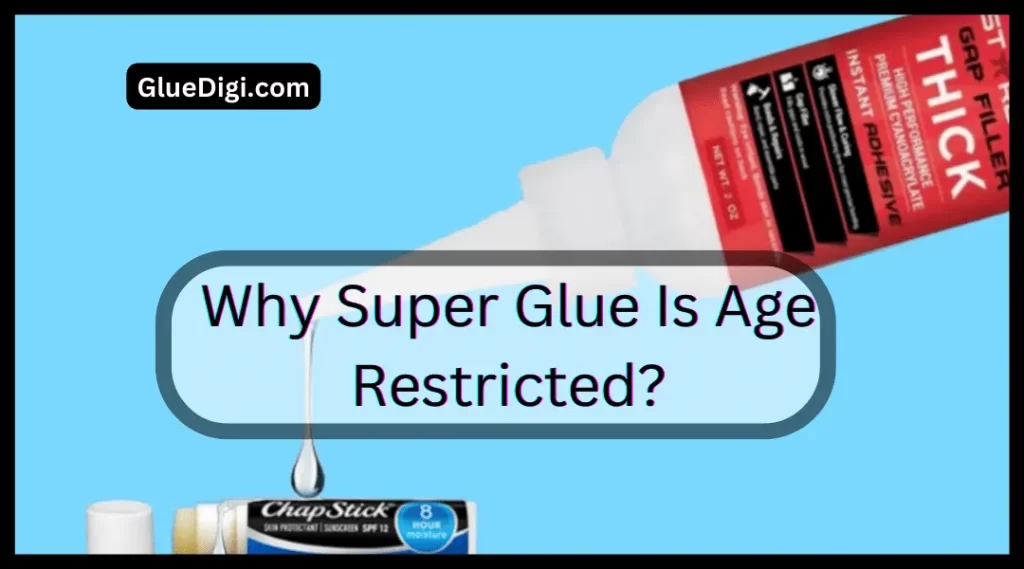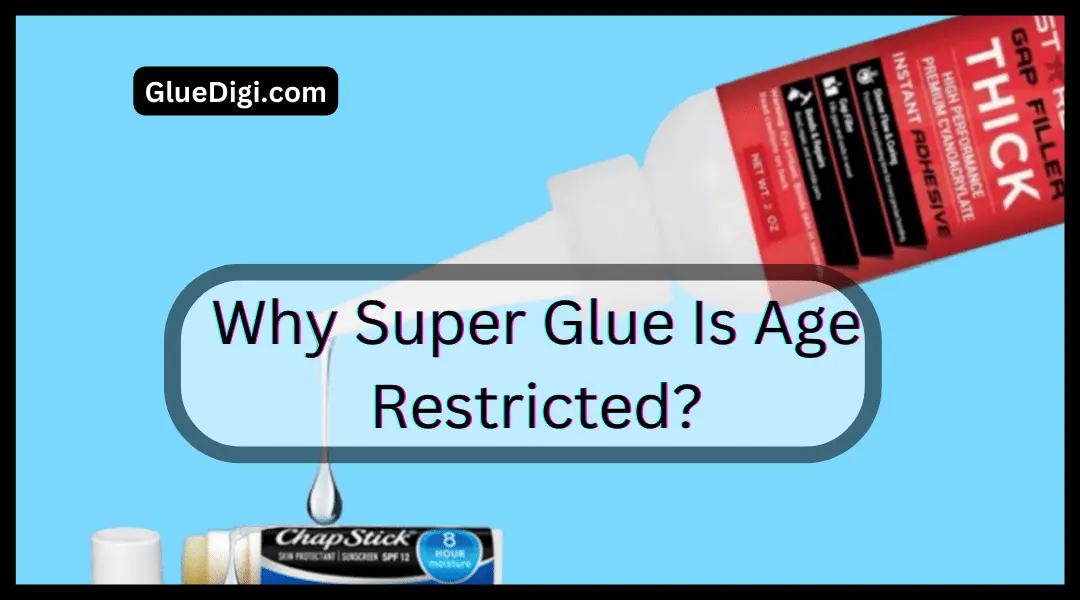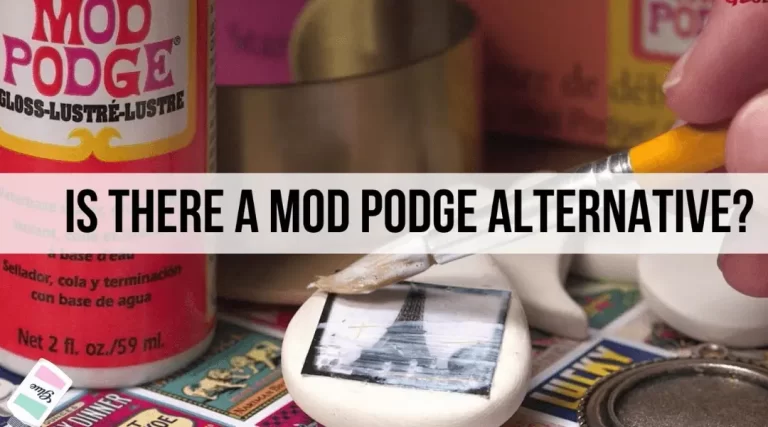Have you ever wondered why super glue is age restricted? You’re not alone! It’s a common question that many people have. Super glue has a range of uses, and it can be highly beneficial in a variety of situations – so why isn’t it available for everyone to use?
Let’s dive into this peculiar topic and uncover the taste, health risks, and even unique uses of glue beyond its intended purpose.
In this article, I’m going to take an in-depth look at the reasons behind age restrictions on super glue. I’ll uncover what implications these restrictions have, and how they affect our subconscious desire for freedom. So keep reading to find out why we can’t get our hands on super glue without being a certain age!
Super glue’s usage has extended beyond fixing household items due to its powerful adhesive properties. From medical treatments to industrial applications, people have used super glue in various ways throughout history. Unfortunately, due to its potentially hazardous nature, governments have placed restrictions on who can buy this product and when. This begs the question: why are there age restrictions on super glue?
What Is Super Glue?
Superglue, also known as cyanoacrylate, is a popular adhesive that has many uses. Its properties makes it useful for everything from repairing eyeglasses to bonding plastic materials. One can utilize it in a broad range of scenarios, and Many consider it to be among the most versatile adhesives currently available in the market.
The superglue formula consists of ethyl cyanoacrylate monomer which reacts with moisture to form strong bonds. When two surfaces come into contact, this process occurs almost instantaneously, creating an exceptionally robust bond without requiring any curing time or additional tools such as clamps or other devices. Superglue is also quick and easy to use, meaning that even novice DIYers can quickly repair broken items or build something new with it.
However, using super glue carries certain risks despite its many advantages. Knowing these dangers and how to safely handle superglue is essential before attempting any projects involving this adhesive. Keeping this in mind, let us examine the reasons behind super glue’s age restrictions and the precautions that a person must take while using it.
Why Super Glue Is Age Restricted?

Super glue, a type of cyanoacrylate adhesive, has become an essential item in many households. But its versatility and effectiveness come with a hidden danger. Despite the widespread use of super glue, many people don’t realize that it can be hazardous if not used properly. That’s why it is age-restricted in some places.
When it comes to toxicity, ingesting or inhaling super glue can cause serious health problems. Ingestion can result in vomiting, diarrhea, and difficulty breathing. Inhalation may lead to headaches, dizziness, and respiratory irritation. Super glue also has the potential to cause chemical burns on the skin from direct contact. Additionally, skin irritation is possible from prolonged exposure or contact with large amounts of the adhesive.
Given these risks, it’s no wonder that super glue is age-restricted in certain places. Children and teenagers are particularly at risk of accidental ingestion or inhalation due to their curiosity and lack of awareness about potential hazards associated with this powerful adhesive. Therefore, adults should take necessary precautions when handling super glue around children and teenagers to ensure their safety and well-being.
Potential Hazards For Children
If one does not take proper precautions, super glue can be hazardous for children, and that is why age restrictions exist for its use. Ingesting or inhaling the toxic cyanoacrylate found in super glue can cause serious health issues. Children may accidentally ingest super glue, mistaking it for candy, or inhale the glue fumes if they are present in the same room during its application. Therefore, one must take into account the safety of children while using and storing super glue.
When using any type of adhesive, it is important to be aware of the potential hazards that come with it. The fumes created by superglue can irritate eyes and lungs, as well as cause headaches in some people. Ingesting superglue can lead to nausea, vomiting, and intestinal blockages that require surgical removal. Furthermore, since it is highly flammable, so anybody must never use in close proximity to an open flame or heat source.
These risks are why super glue has restrictions on its sale and use around children. It’s important to keep all adhesives properly stored away from children and pets at all times. When using adhesives around children, responsible adult supervision is essential for their safe use.
With these precautions in mind, it’s important to consider what other toxic substances may be present in superglue and how they could affect human health.
Toxic Substances In Super Glue
Is it really necessary to age-restrict super glue? After all, it’s just a simple adhesive that has been around since the 1940s. Come on, world! Let’s get our act together and stop treating adults like little kids! But alas, we must face the facts: Superglue contains cyanoacrylate which is a toxic chemical compound and can be dangerous if ingested or inhaled.
So why does super glue come with an age restriction? Well, let’s take a look at the cyanoacrylate safety assessment. It turns out that this chemical compound can cause skin irritation, allergic reactions and respiratory problems when exposed to high concentrations in an enclosed environment. In addition, long-term exposure to even low levels of cyanoacrylate has been linked to cancer in animals.
Given these potential health risks associated with superglue, it is understandable why manufacturers have deemed it necessary to place age restrictions on its sale and usage. After all, children are more vulnerable to any toxic substances present in the product due to their smaller body mass and less developed organs. The best way for us adults to ensure their safety is by keeping superglue away from them while also following safety instructions carefully when using it ourselves.
With such precautions in place, we can enjoy the benefits of this powerful adhesive without exposing our loved ones (or ourselves!) to any health risks associated with inhaling fumes or touching its contents directly.
Health Risks Associated With Inhaling Fumes
When super glue is used, it releases strong fumes that contain cyanoacrylate. These fumes can be dangerous when inhaled due to the health risks associated with them. Not only can cyanoacrylate fumes cause irritation to the eyes and throat, but they can also cause more serious long-term health effects such as headaches, nausea and asthma. In some cases, exposure to glue fumes may even result in chemical burns on the skin or lungs.
It’s important to be aware of these potential risks when using super glue and take steps to protect yourself from inhaling any of these adhesive fumes. Proper ventilation is key; make sure you’re in a well-ventilated area before using any type of adhesive product, and always wear protective clothing such as gloves and a face mask. Additionally, try not to stay in an enclosed space for too long after applying super glue.
The consequences of inhaling cyanoacrylate fumes are clear; that’s why there are laws in place surrounding age restrictions on super glue products. Although everyone should take precautions when working with adhesives, children are especially vulnerable to the potential dangers posed by these products, which is why age restrictions exist in most countries around the world. With this knowledge, we can move forward into studying the laws behind these age restrictions on super glue use.
Laws Surrounding Age Restrictions On Super Glue
As the noxious fumes of super glue linger in the air, it’s important to consider the laws surrounding this hazardous substance. As with many products, age restrictions exist for cyanoacrylate adhesives, and for good reason too.
It’s easy to see why governments would implement these laws when we consider that super glue was initially developed as a medical adhesive and later became available on store shelves. So, why are age restrictions necessary? In short, it is because of the potential health risks associated with inhaling or coming into contact with super glue.
If super glue comes into direct contact with the skin, it can cause skin irritation or burns. Additionally, heating super glue can release harmful fumes that can cause significant harm. The chemicals utilized in cyanoacrylate adhesives can also result in lung damage if their particles are directly inhaled into the lungs. Additionally, because super glue dries so quickly and thoroughly, it can be very difficult to remove from skin or other surfaces without causing further damage. Products containing cyanoacrylate adhesives have age restrictions because of all these reasons
Age restrictions on Super Glue protect us from putting ourselves at risk of suffering potentially severe health effects due to these hazardous substances. It’s essential that we are aware of current legislation surrounding such products and remain vigilant when using them in our daily lives.
Products That Contain Cyanoacrylate Adhesives And Their Age Restrictions
Age restrictions for products that contain cyanoacrylate adhesives, such as super glue, are in place for the safety of children. Super glue fumes can be extremely harmful if inhaled and can cause severe respiratory damage. Furthermore, the adhesive itself is very powerful and if not used carefully or by an adult, it could cause serious injury or even death.
Here is a list of things to consider when purchasing adhesive products with cyanoacrylate adhesives:
- Cyanoacrylate adhesives should only be used by adults due to their strength and potential dangers associated with improper use.
- Children should never come in contact with any product containing cyanoacrylate adhesive fumes.
- Super glue should always be stored out of reach of children to avoid accidental ingestion.
Age restrictions are put in place to keep our kids safe from dangerous products like super glue, but there are alternatives available that don’t require age restriction labels. Adhesive products without cyanoacrylate ingredients are available on the market and offer the same performance without the potential risks associated with cyanoacrylate based glues. With these alternatives, adults can still get their projects done while avoiding any potential danger to children or themselves. As we move forward into a world where safety is paramount, it’s important to know what products are available that won’t put you or your family at risk. Let’s take a closer look at these alternatives next.
Alternatives To Super Glue
Ah, the age-old dilemma: super glue has been restricted in some places due to its powerful adhesive abilities and its potential danger. But what if you need a strong adhesive and don’t have access to super glue? Fear not – there are plenty of alternatives that can get the job done!
Hot Glue Guns
For starters, let’s talk about hot glue guns. Hot glue guns are an excellent alternative to super glue because they provide a stronger bond than regular white glues. They also dry quickly and can be used on multiple materials including fabric, plastic, wood, and metal. Plus they come in various shapes and sizes so you can find the perfect one for your project.
Contact Cement
Next up is contact cement. This type of adhesive is great for adhering two surfaces together without having to wait for it to dry. It works especially well for bonding leather, vinyl, rubber, and other materials that require a strong hold. Contact cement is easy to use but it does have a strong odor so make sure your work area is well ventilated when using it.
Epoxy Resin
Epoxy resin is another popular alternative to super glue as it provides a strong bond between two surfaces without having to wait for it to dry. They come in two parts – a resin and hardener – which must be mixed together before use. The resulting mixture creates an extremely strong bond that will last for years!
Gluing Tape
Gluing tape is also an option if you’re looking for something quick and easy to use on small projects or repairs around the house. It comes in different sizes and widths so you can find the perfect one for your needs. It’s also great for crafting projects since it won’t damage or discolor delicate fabrics like paper or cloth.
Finally, clear nail polish can also be used as an alternative adhesive if you need something quick and easy to apply on small items such as jewelry or buttons. Simply paint on a thin layer of clear nail polish onto the surface of your item and let it dry completely before using!
| Ingredients | Purpose |
| Hot Glue Gun | Strong bond between multiple materials |
| Contact Cement | Bonding leather, vinyl, rubber & other materials |
| Epoxy Resin | Strong bond between two surfaces without drying time |
| Gluing Tape | Quick & easy repair/craft projects without damage/discoloration of delicate fabrics (paper/cloth) |
| Clear Nail Polish | Quick & easy application on small items (jewelry/buttons) |
All these alternatives offer great options when considering adhesives instead of super glue – each with their own unique advantages depending on what type of project you’re working on! Whether you need something quick & easy or something that will last longer than super glue – these alternatives provide just what you need while still ensuring safety & security while handling them. Now that we’ve gone over some alternatives to super glue, let’s move onto how to apply super glue safely!
How To Apply Super Glue Safely
Applying super glue can be tricky if you don’t take the necessary precautions. Prior to starting any project involving super glue, it is essential to read and comprehend the instructions and safety measures. When using super glue, one should keep in mind a few tips to ensure its safe and secure application.
First, make sure your work surface is clean and dry before applying the glue. Any dirt or dust particles can interfere with the adhesive bond of the glue, so it’s important to remove any debris from the area around where you will be applying it. Next, use a small amount of super glue on one surface, then press or clamp the two surfaces together firmly for at least 60 seconds. Applying pressure during the process will create a more robust bond between the surfaces, making it last longer than merely keeping them together without pressure.
Finally, remember that super glue is an age-restricted product for good reason – it has been known to cause skin irritation and burn when not handled properly. So always wear gloves when handling super glue and avoid contact with your eyes, skin and mouth. By taking these extra precautions when applying super glue, you can ensure that your project turns out perfectly every time!
Tips For Using Super Glue Responsibly
Did you know that adults aged 18 and above account for nearly two-thirds of all glue purchases? While super glue may have age restrictions, it is vital to use it responsibly and safely. Here are a few tips on how to do just that when using cyanoacrylate adhesives:
First, always wear safety glasses or goggles when using super glue. This will help protect your eyes from accidental contact with the adhesive. Second, keep your work area clean and organized. Clean up any spilled super glue immediately and make sure to apply the adhesive in an area where there will be no risk of it getting on other surfaces or objects. Third, take precautions when applying the adhesive. Make sure to read all instructions carefully before applying and never use your hands as a clamping device or tool for spreading the adhesive.
It is also important to keep in mind that super glue has its limits; it may not work on certain materials such as rubber, plastic, fabric and foam. Be aware of what kind of material you’re working with so you can choose an appropriate adhesive for the job. Lastly, if you ever find yourself dealing with a large amount of super glue residue, try using mineral spirits or acetone to clean it up safely and effectively.
With these tips in mind, you can ensure responsible application of super glue while still enjoying its many benefits! Keeping these guidelines in mind will help ensure safe and effective use of this powerful adhesive every time you use it.
Conclusion
why super glue is age restricted? Super Glue is an adhesive product that can be used to make a wide variety of repairs and projects. It has a long shelf life and is relatively easy to use and remove, which makes it a popular choice among DIYers. However, it’s important to remember that it can be dangerous if not used correctly, which is why it is age restricted in many countries.
Did you know that Super Glue was used as a battlefield wound dressing during the Vietnam War? This was because its fast-acting adhesive properties meant that wounds could be treated quickly and with minimal blood loss. This statistic shows how powerful this product can be when used in the right circumstances!
Super Glue isn’t something to be taken lightly – it should always be used responsibly and with caution. Whether you’re using it for repairs or craft projects, make sure you follow all instructions carefully so you don’t risk injuring yourself or others. With that being said, Super Glue is an incredibly useful product with varied applications – so don’t let its age restriction stop you from exploring its potential!







